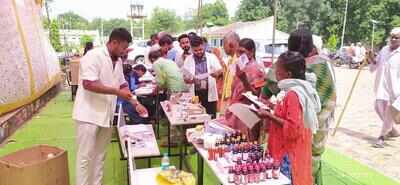- News
- City News
- nagpur News
- Tribals turn up as MUHS’s healthcare ‘Blossoms’ in Ramtek villages
Tribals turn up as MUHS’s healthcare ‘Blossoms’ in Ramtek villages

The project Blossom will cover 18 villages having 85% tribal population in four districts
Nagpur: The scene outside an ashram school and junior college in Belada village in Ramtek tehsil, about 80kms from Nagpur, was festive on Thursday. The elderlies, women, youths and kids lined up anxiously waiting for their turn for registration.
Harichand Uikey, a 70-year-old tribal farmer from Gorhe Ghat village, was relieved to know he doesn't have any major illness after going through a series of clinical evaluations. Two more elderly women from Navegaon were bit upset to know that their village was not covered in the camp. “They are being enrolled as we can't deny health check up to anyone,” said Dr Shilpa Hazare, chief investigator of Blossom project.
Over 1,000 tribals from Gorhe Ghat, Belada and Navegaon villages turned up at the centre for the camp under the Blossom project implemented by the Nagpur regional centre of of Maharashtra University of Health Sciences (MUHS).
The project Blossom — breast cancer, liver disease, osteoporosis, sickle cell, sexually transmitted diseases, oral cancer, malnutrition — will cover 18 villages having 85% tribal population in four districts for screening and surveillance of these diseases. The research, supported by MUHS VC Madhuri Kanitkar, kicked off from five villages in Nagpur in September.
Belada was the last of the five villages shortlisted under the project. The ‘dawadis’, as the public address system is known among adivasis, took the message to nearby villages Belada and Navegaon, bringing them under the study. Additional tribal commissioner Ravindra Thakre’s team has been assisting the medical teams.
Devinder Uikey (31), a resident of Belada, skipped his farm work to come for the check up. “All from my village were coming, so I too joined. We were told treatment and blood tests would be free of cost,” he said.
Police patil Vikram Uikey (55) said the camp assures five years of free healthcare benefits. “Blood tests would screen us for seven major diseases and they will follow up our case at big hospitals if needed. All this for free,” said Uikey.
Dr Ajeet Saoji, principal investigator of Blossom, said NSS volunteers from medical colleges will later monitor them in twice a month survey.
Belada sarpanch Umesh Bhandarkar said the project needs to cover more villages from the tribal belt of Ramtek-Parseoni. “Over 52 villages in Deolapur in this belt have cent per cent tribal population. We have poor health care services. At least, tribals will now get prompt services,” he said.
Dr Sanjeev Choudhary, co-ordinator of Blossom and director of MUHS Nagpur centre, said the study has one of the biggest samples sizes. “We shall have over 2,500 tribals enrolled in this study after we complete the screening under phase-I. Their primary health history would be available using the health card to be issued later. They shall be categorized in three zones – yellow, green and red. The first will include counselling, second delivery of medicines at doorstep and third moving sick person to hospital,” said Dr Choudhary, who is al a well-known orthopaedic.
Dr Dilip Gode, professor and chair of tribal health and research at MUHS, said, “Prima facie, lifestyle diseases appear to be prevalent among tribals though the study is still underway. The health data will be analysed by medical experts from across the state. They will recommend collective solutions which are likely to help formulate a new policy. Ultimately, the research shall help publish a white paper on tribal health,” he said.
Harichand Uikey, a 70-year-old tribal farmer from Gorhe Ghat village, was relieved to know he doesn't have any major illness after going through a series of clinical evaluations. Two more elderly women from Navegaon were bit upset to know that their village was not covered in the camp. “They are being enrolled as we can't deny health check up to anyone,” said Dr Shilpa Hazare, chief investigator of Blossom project.
Over 1,000 tribals from Gorhe Ghat, Belada and Navegaon villages turned up at the centre for the camp under the Blossom project implemented by the Nagpur regional centre of of Maharashtra University of Health Sciences (MUHS).
The project Blossom — breast cancer, liver disease, osteoporosis, sickle cell, sexually transmitted diseases, oral cancer, malnutrition — will cover 18 villages having 85% tribal population in four districts for screening and surveillance of these diseases. The research, supported by MUHS VC Madhuri Kanitkar, kicked off from five villages in Nagpur in September.
Belada was the last of the five villages shortlisted under the project. The ‘dawadis’, as the public address system is known among adivasis, took the message to nearby villages Belada and Navegaon, bringing them under the study. Additional tribal commissioner Ravindra Thakre’s team has been assisting the medical teams.
Devinder Uikey (31), a resident of Belada, skipped his farm work to come for the check up. “All from my village were coming, so I too joined. We were told treatment and blood tests would be free of cost,” he said.
Police patil Vikram Uikey (55) said the camp assures five years of free healthcare benefits. “Blood tests would screen us for seven major diseases and they will follow up our case at big hospitals if needed. All this for free,” said Uikey.
Dr Ajeet Saoji, principal investigator of Blossom, said NSS volunteers from medical colleges will later monitor them in twice a month survey.
Belada sarpanch Umesh Bhandarkar said the project needs to cover more villages from the tribal belt of Ramtek-Parseoni. “Over 52 villages in Deolapur in this belt have cent per cent tribal population. We have poor health care services. At least, tribals will now get prompt services,” he said.
Dr Sanjeev Choudhary, co-ordinator of Blossom and director of MUHS Nagpur centre, said the study has one of the biggest samples sizes. “We shall have over 2,500 tribals enrolled in this study after we complete the screening under phase-I. Their primary health history would be available using the health card to be issued later. They shall be categorized in three zones – yellow, green and red. The first will include counselling, second delivery of medicines at doorstep and third moving sick person to hospital,” said Dr Choudhary, who is al a well-known orthopaedic.
Dr Dilip Gode, professor and chair of tribal health and research at MUHS, said, “Prima facie, lifestyle diseases appear to be prevalent among tribals though the study is still underway. The health data will be analysed by medical experts from across the state. They will recommend collective solutions which are likely to help formulate a new policy. Ultimately, the research shall help publish a white paper on tribal health,” he said.
FOLLOW US ON SOCIAL MEDIA
FacebookTwitterInstagramKOO APPYOUTUBE
Start a Conversation
end of article









